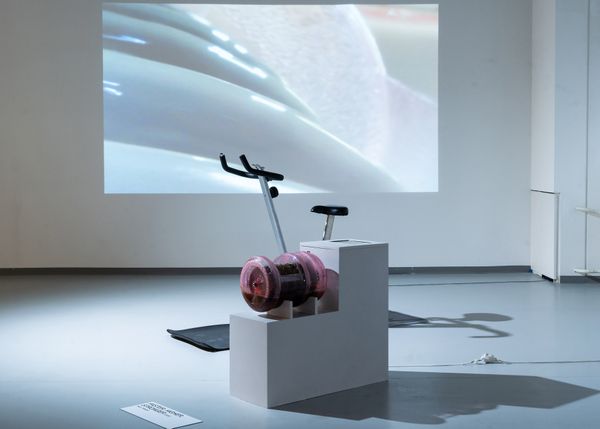The side program entitled Loose Threads weaves together different and diverse understanding of technology. The panel discussion looks at the reductive history of technology and its mode of representation.
The current exhibition Fabric of Dreams. Towards a Technodiversity raises the question of how we can escape the singular vision of technology and its rather definitive configuration as a fully automated machine intelligence. According to the Western conception, technology is described as a history of development on the way to progression and expansion, be it in a dystopian or utopian implementation. Drawing on Foucault's discourse analysis of knowledge systems, philosopher Yuk Hui argues for different epistemes in relation to the narrative of technology, which he calls Technodiversity.
Panelist:
Kristoffer Gansing
Kristoffer Gansing is a media theorist and curator with a PhD in media studies from the School of Arts & Communication at Malmö University in Sweden. He is currently professor of Artistic Research at the Royal Danish Academy of Fine Arts in Copenhagen where he also directs the International Center for Knowledge in the Arts. Previously, Mr. Gansing was artistic director of the art and digital culture festival, Transmediale, in Berlin, where he directed nine editions from 2012 to 2020.

Intersecting art, research and media technology, Gansing’s work has often taken the form of critical interrogations of art and technology from a post-digital perspective where digitisation forms part of everyday life. His PhD Transversal Media Practices (2013), included two case-studies on how media archaeological art practices reconfigure linear conceptions of technological development and was published by Malmö University Press in 2013. With Ryan Bishop, Jussi Parikka and Elvia Wilk he edited across & beyond – a transmediale reader on Post-digital Practices, Concepts, and Institutions published by Sternberg Press in 2016. In 2020, he edited The Eternal Network – The Ends and Becomings of Network Culture published through the Institute of Network Cultures in Amsterdam. His current research focuses on the techno-aesthetics of infrastructure, and will be published in a forthcoming short form in 2022. Through his research, curatorial activity and writing, Gansing develops transversal and post-digital perspectives and methodologies, that aim to both situate and transform cultural practices. He is particularly interested in moving beyond representational forms in favour of situated and performative aesthetics.
Tung-Hui Hu
Poet, former network engineer and scholar of digital media Tung-Hui Hu will give insights into his new project about digital infrastructure in the global South. In his book A Prehistory of the Cloud he investigates ideologies behind digital technology and offers a set of new tools for rethinking the contemporary digital environment.

Hu currently lives in Rome, where he is a 2022-23 Rome Prize Fellow in Literature at the American Academy in Rome. He is the author of three books of poetry, most recently Greenhouses, Lighthouses, which grew out of his graduate studies in film, as well as two studies of digital culture, A Prehistory of the Cloud and Digital Lethargy: Dispatches from an Age of Disconnection, an exploration of burnout, isolation, and disempowerment in the digital underclass.
A former network engineer, he is an associate professor of English at the University of Michigan. He is at work on two new projects: a book of poems on the idea of punishment, and a book on digital infrastructure in the global South. He has received an American Academy in Berlin Prize for his research and a National Endowment for the Arts fellowship for his poetry. His poems have been published in places such as Boston Review, The New Republic, Ploughshares, the Academy of American Poets's Poem-a-Day, and the anthology Family Resemblance: An Anthology and Exploration of Hybrid Literary Genres. In 2023-24, he will be a Humboldt Research Fellow at Martin-Luther-Universität Halle, Germany.
Luiza Prado de O. Martins
Luiza Prado de O. Martins’s artistic exploration is examining plant-human relations, reproduction and herbal medicine and questions of reproductive rights from a feminist and anti-colonial lens. In her installation within the exhibition she is investigating the commodification of a high-valued but extinct plant and the insertion into early monetary systems, as a capitalist technology.

Luiza Prado de O. Martins is an artist, writer, educator, and researcher investigating plant-human relations, reproduction, herbal medicine, and radical, decolonising care. Her body of artistic work spans video, food, performance, and sculpture, examining questions of reproductive rights from a feminist and anti-colonial lens, with a particular interest in herbalist medicinal practices. Her ongoing artistic research project, “Un/Earthings and Moon Landings” narrates the extinction and later reappearance of an ancient contraceptive, aphrodisiac and spice, called silphium, through a series of artworks. The project explores the limits of archival practices in landscapes affected by anthropogenic climate change. In the past, Prado has exhibited work at the Art Institute of Chicago, the Museum of Modern Art Warsaw, Haus der Kulturen der Welt, Savvy Contemporary, Akademie Schloss Solitude, and Kampnagel, among others. She is part of the art duo We Work in the Dark, together with musician and artist Obaro Ejimiwe/Ghostpoet.
Program Overview
17:00–24:00
5 pm Exhibition tour with artists and curators
6 pm Panel with:
8 pm Performance Beyond My Skin
A project by Flavia Mazzanti, produced by Immerea, Performers: Olivia Hild, Imani Rameses, Sound: Brootworth
9 pm Sound Performance by
Dr. Obaro Ejimiwe/Ghostpoet
10 pm DJ-Set by
isocialbutterflyy
More info

















